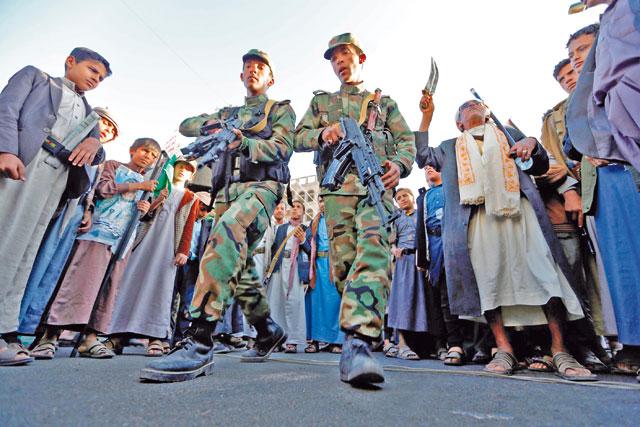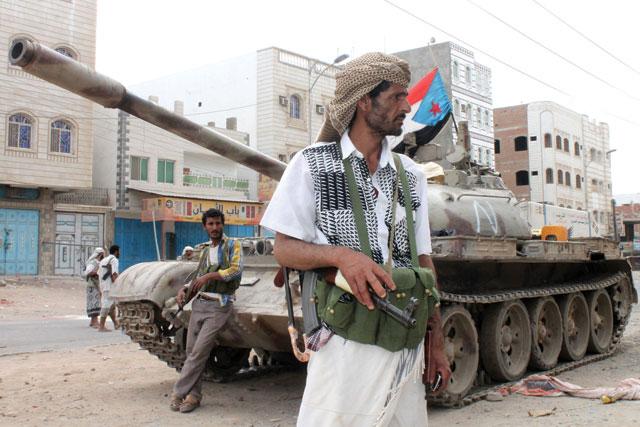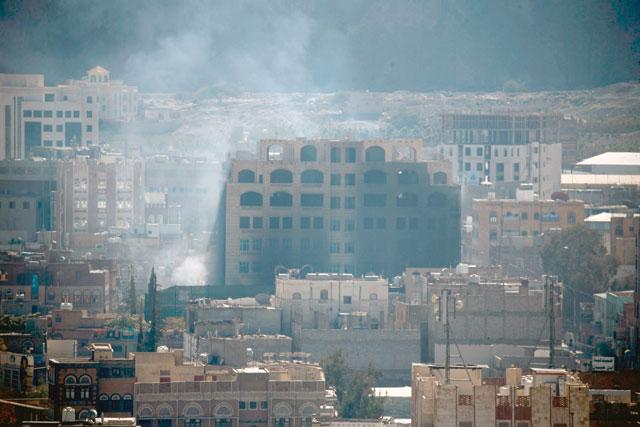You are here
Exiled son of Yemen’s Saleh takes up anti-Houthi cause
By Reuters - Dec 06,2017 - Last updated at Dec 06,2017

Yemeni Houthi rebel fighters march during a rally celebrating the death of Yemeni ex-president Ali Abdullah Saleh a day after he was killed, in the capital Sanaa, on Tuesday (AFP photo)
SANAA/DUBAI — The powerful exiled son of Yemen’s slain ex-president Ali Abdullah Saleh vowed on Tuesday to lead a campaign against the Houthi movement that killed his father after he switched sides in the civil war.
The intervention by Ahmed Ali Saleh, a former leader of the elite Republican Guard once seen as a likely successor to his father, gives the anti-Houthi movement in Sanaa a potential figurehead, after a week of fighting that saw the Houthis rout Saleh’s supporters in the capital.
Yemen’s war, pitting the Iran-allied Houthis who control Sanaa against a Saudi-led military alliance backing a government based in the south, has brought what the United Nations calls the world’s worst humanitarian crisis.
The world body says millions of people may die in one of the worst famines of modern times, caused by warring parties blocking food supplies.
Saleh had helped the Houthis win control of much of the country’s north including Sanaa, and his decision to switch allegiances and abandon the Houthis in the past week was the most dramatic change on the battlefield in years. But the Houthis swiftly crushed a pro-Saleh uprising in the capital and shot him dead in an attack on his convoy.
Tens of thousands of Houthi supporters staged a rally in the capital on Tuesday to show support for their leader and celebrate the death of Saleh. They chanted slogans against Saudi Arabia and its allies.
Mahmoud Ali Al Houthi, head of the movement’s Revolutionary Committee, denied allegations that the group was executing members of Saleh’s party after their capture: “We have been treating some of Saleh’s sons and we haven’t executed them,” he told the crowd.
Sanaa saw no fresh fighting on Tuesday after five days of combat that the Red Cross said killed more than 230 people. The Saudi-led coalition struck the city with 25 air strikes overnight, but UN and Red Cross aid flights were able to land at the airport, UN humanitarian coordinator in Yemen Jamie McGoldrick said.
“People are now emerging from their houses after five days being locked down basically as prisoners,” McGoldrick told a UN briefing by phone from Sanaa. “They are now seeking safety, moving their families in case things erupt again and at the same time seeking medical treatment and trying to pacify very terrified kids who have endured five days of relentless shelling, shooting and ground fire and air strikes.”
The Saudi Cabinet, in a statement that did not mention Saleh by name, said it hoped the Sanaa uprising against the Houthis would “help rid sisterly Yemen of repression, death threats, ... explosions and seizure of private and public property”.
Dancing on snakes
The death of Saleh, who once compared ruling Yemen to dancing on the heads of snakes, deepens the complexity of the multi-sided war.
Much is likely to depend on the future allegiances of his loyalists, who had previously helped the armed Houthi group, which hails from the Zaidi branch of Shiite Islam that ruled a thousand-year kingdom in northern Yemen until 1962.
In a statement sent to Reuters by an aide, his son said his father was killed at “the hands of the enemies of God and the country”. Ahmed Ali said he would “confront the enemies of the homeland and humanity, who are trying to obliterate its identity and its gains and to humiliate Yemen and Yemenis”.
In an earlier statement carried by Saudi state media, Ahmed Ali said he would lead “the battle until the last Houthi is thrown out of Yemen ... the blood of my father will be hell ringing in the ears of Iran”.
The Arabian peninsula’s poorest country, Yemen is one of the most violent fronts in a proxy war between Saudi Arabia and Iran, who have also backed opposing sides in Syria, Iraq and elsewhere across the Middle East.
Tipping the balance
The Saudi-led coalition appears to have been counting on Saleh’s decision to switch sides to tip the balance of the war.
Saleh, who ruled in Sanaa from 1978-2012, had a strong following in Yemen, including army officers and armed tribal leaders who once served under him.
During the years the ex-president was allied to the Houthis, Yemeni political sources say Ahmed Ali was living incommunicado under house arrest at a guarded villa in the UAE capital Abu Dhabi, where he had served as ambassador.
The UAE is a key member of the mostly Gulf Arab alliance that sees the Houthis as a proxy of their arch-enemy Iran. The Gulf countries had struggled to make gains against the Houthi-Saleh alliance despite thousands of air strikes backed by Western arms and intelligence. They have used their air and sea power to tightly restrict imports, action that the United Nations says could lead to mass hunger.
Ahmed Ali may be the family’s last chance to win back influence. A nephew of the former leader, Tareq Mohammed Abdullah Saleh, a senior military commander, was also killed during clashes with the Houthis, Saleh’s party said on Tuesday.
Residents reported that fighting had subsided but that Saudi-led coalition jets pounded several targets, including the downtown presidential palace where a governing body led by Houthi-Saleh politicians had regularly convened.
The Houthi leader, Abdul Malek Al Houthi, hailed Saleh’s death in a speech on Monday as a victory against a treasonous conspiracy by Yemen’s Saudi enemies and called for Tuesday’s mass rally at a parade ground near the site of the air strikes.
In the southern city of Aden, where the Saudi-backed government is based, residents set off fireworks and expressed joy. Saleh was hated throughout southern Yemen after he launched a war to unify the country in 1994, lobbing ballistic missiles at the city.
But his legacy is mixed. He is still loved in much of the north and many supporters will bear a grudge towards his killers. Some feared Saleh’s death would only create more instability in Yemen.
“We expect things will get worse for us. This will be the beginning of a new conflict and more bloodshed. The war will not end soon,” said Aswan Abdu Khalid, an academic at the psychology department at the University of Aden.
Related Articles
Three weeks of Saudi-led air strikes in Yemen have led to defections of army units loyal to former president Ali Abdullah Saleh, military sources said, dealing a blow to his efforts to stage a comeback.
ADEN — A Saudi-led coalition launched air strikes on Yemen's capital, Sanaa, local media said, lending support to former Yemeni president Al
RIYADH — Yemen's Houthi rebels on Wednesday announced they had released two of slain ex-president Ali Abdallah Saleh's sons, 10 months after













